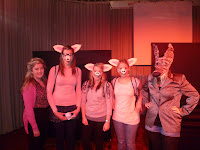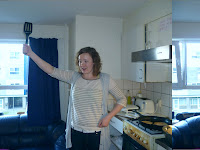Personal Reflection
7th - 14th May
 |
| Final Performance |
I’m finding it really hard to believe that Week 16 has come and gone and this will be the last blog I will right from Flat 2 in Vossenveld which I have made my home for the last four months. People who know me know that I am a ‘homebird’ and love getting home from Belfast on a Friday evening for some home comforts. With this in mind and the very emotional goodbyes that took place the night before I left, I’m pretty sure there were many people who wondered would I ever last the four months. Little did they know that I was determined to see it to the end as I knew that this would be an experience of a lifetime.
 |
| Final Performance |
Everyone who I talked to before I left told me the time would fly and it really has. Looking back I can vividly remember sitting in this same room writing my first blog post and now I wonder where the time has went to. At this point my emotions are very mixed. Although I am very excited about getting home to see my family and friends, I am going to miss Nijmegen and the way of life that I made for myself here. It will be strange not living with these people who have been my flatmates, my classmates and in many ways my family for the last four months.
Having spent so much time with each other I have learned a lot about these people. It has been very interesting to live with people from other cultures and find out how they live life, the values they uphold and how they conduct themselves around other people. This has made me really reflect on myself as a person and many aspects of their personalities have positively influenced me. As well as this I would say I am more certain and confident in what I uphold as my values in life and desirable personality traits.
 |
| The collage we made Harry for all his help with the international students. |
There have also been many aspects of the Dutch lifestyle that I have embraced. One particular aspect is the relaxed lifestyle. Too often in Ireland we get worked up and stressed about matters that are irrelevant and unimportant. I have found that when it comes to assignments deadlines here in The Netherlands that nobody really gets stressed out whereas in contrast to this at home we are all nearly tearing our hair out. The Dutch set a deadline but it is a case of whenever they get the work they get it, whether it is a day early, 2 days late or a month late. One must consider that if the work is not completed in time with a schedule they can just postpone their graduation to the next year. With the organised and structured mentality people seem to work with in Ireland I cannot ever see this being the case. Although I like the more relaxed attitude to many aspects of life here, as a future educator I think there are many aspects in life in which organisation and accountability is fundamental in order to maintain standards, e.g. assessment.
In all, I can wholeheartedly say this has been a once in a lifetime experience and everything that I hoped it would be. I have seen many places, met many new people of which I will be keeping in contact with and I have learned so much about myself. I would recommend it to anyone who has the opportunity to go. Although we all have preferences in places that we’d like to go to, I personally think you can have this experience in any country as it’s what you make it. You must step out of your comfort zone, embrace the culture and the language and make an effort to meet new people in order to the most of any experience.
Kathryn
 |
| The International Class! |













































